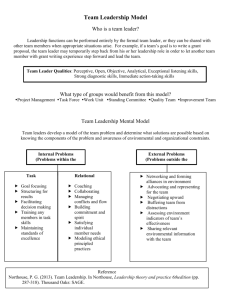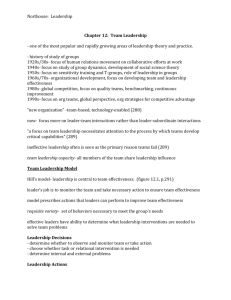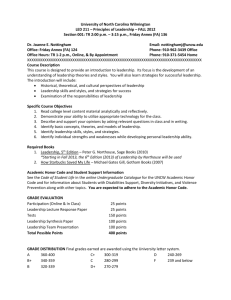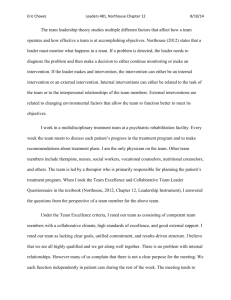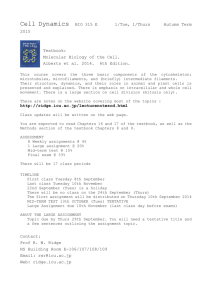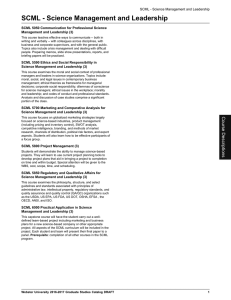DocNott University of North Carolina Wilmington LED 211
advertisement
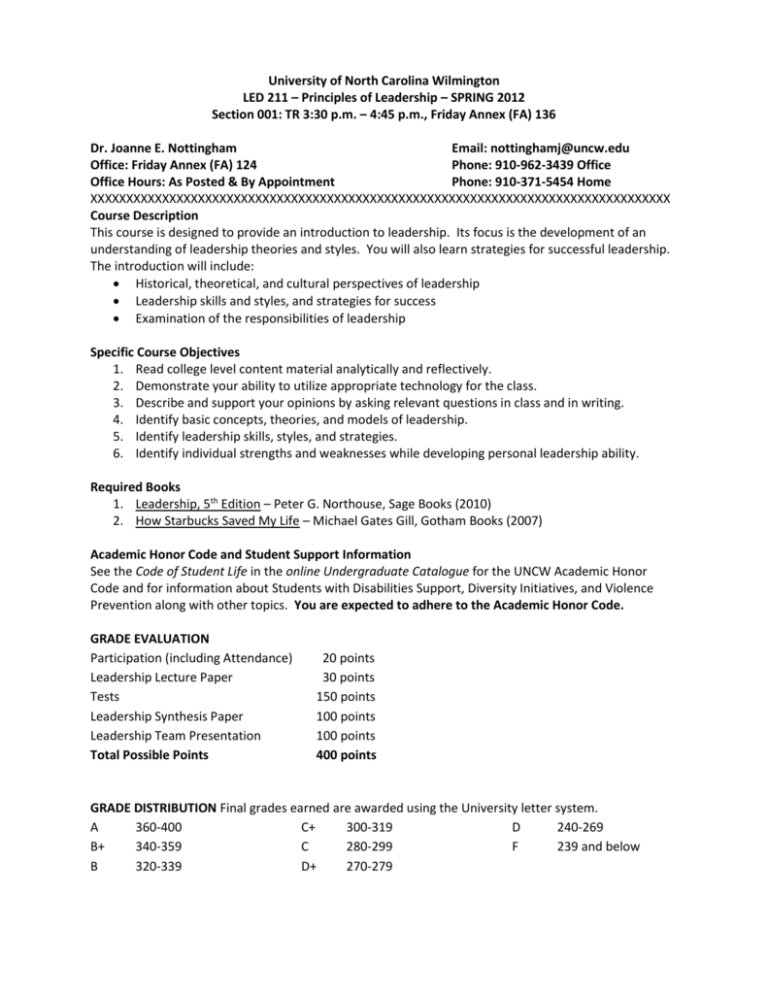
University of North Carolina Wilmington LED 211 – Principles of Leadership – SPRING 2012 Section 001: TR 3:30 p.m. – 4:45 p.m., Friday Annex (FA) 136 Dr. Joanne E. Nottingham Email: nottinghamj@uncw.edu Office: Friday Annex (FA) 124 Phone: 910-962-3439 Office Office Hours: As Posted & By Appointment Phone: 910-371-5454 Home XXXXXXXXXXXXXXXXXXXXXXXXXXXXXXXXXXXXXXXXXXXXXXXXXXXXXXXXXXXXXXXXXXXXXXXXXXXXXXXXX Course Description This course is designed to provide an introduction to leadership. Its focus is the development of an understanding of leadership theories and styles. You will also learn strategies for successful leadership. The introduction will include: Historical, theoretical, and cultural perspectives of leadership Leadership skills and styles, and strategies for success Examination of the responsibilities of leadership Specific Course Objectives 1. Read college level content material analytically and reflectively. 2. Demonstrate your ability to utilize appropriate technology for the class. 3. Describe and support your opinions by asking relevant questions in class and in writing. 4. Identify basic concepts, theories, and models of leadership. 5. Identify leadership skills, styles, and strategies. 6. Identify individual strengths and weaknesses while developing personal leadership ability. Required Books 1. Leadership, 5th Edition – Peter G. Northouse, Sage Books (2010) 2. How Starbucks Saved My Life – Michael Gates Gill, Gotham Books (2007) Academic Honor Code and Student Support Information See the Code of Student Life in the online Undergraduate Catalogue for the UNCW Academic Honor Code and for information about Students with Disabilities Support, Diversity Initiatives, and Violence Prevention along with other topics. You are expected to adhere to the Academic Honor Code. GRADE EVALUATION Participation (including Attendance) Leadership Lecture Paper Tests Leadership Synthesis Paper Leadership Team Presentation Total Possible Points 20 points 30 points 150 points 100 points 100 points 400 points GRADE DISTRIBUTION Final grades earned are awarded using the University letter system. A 360-400 C+ 300-319 D 240-269 B+ 340-359 C 280-299 F 239 and below B 320-339 D+ 270-279 CLASS ATTENDANCE & PROTOCOLS Inappropriate use of cell phones, pagers, and laptops and/or your absence on an in-class activity day will result in the loss of points. Absence from a test will result in ZERO (0) points earned and NO makeup test will be given. Late submission of an assignment or paper will result in a point deduction of 15% per day. Three class absences (after January 18, 2012) will result in the lowering of your grade by one level. Absence from any student’s in-class presentation will result in the lowering of your grade by one level. None of the reasons above excuse you from fulfilling all course requirements. Absence from 25% of class meeting days (7 days) will result in a grade of “F”. A letter grade reduction = A to B+, B+ to B, B to C+, C+ to C, etc. Please make an appointment with me within the first three (3) weeks of class if you have scholarship responsibilities that require you to miss classes due to events or performances. UNCW Email is the required method for online class communication. Include on each: 1) SUBJECT in the Subject Line, 2) FIRST & LAST NAME + 3) YOUR PHONE CONTACT Course materials will be distributed in class, available online through the text publisher’s webpages, or posted on my UNCW Web Page. The instructional goal of all assignments, papers, and tests is to assess your ability to provide credible evidence of what you have learned about leadership theory and practice. EXPECTATION OF COLLEGE LEVEL WRITING SKILLS on WRITTEN ASSIGNMENTS Your College Level Writing (CLW) ability will be evaluated and an appropriate number of points will be deducted for lack of clarity of thought and/or lack of appropriate college level writing (CLW) skills. If you have difficulty with writing, you are expected to contact the Writing Center or a tutor for assistance, and use a writing guide for help. An APA online site is http://www.nova.edu/library/dils/lessons/apa/. The following guidelines are helpful but it is your responsibility to get the writing assistance you need. Indication of Excellent (A) Understanding – Clear, succinct statements of all your points, supported by original sources with credit given; thoughtful and original personal reflections of extremely solid understanding, appropriate applications of the points discussed; depth and breadth of thought; no spelling, typographical, or grammatical errors. Indication of Very Good (B+) Understanding – Clear, succinct statements of most of your points, supported by original sources with some credit given; thoughtful and sound personal reflections of a fairly solid understanding of points discussed; few spelling, typographical, or grammatical errors. Indication of Good (B) Understanding – Clear, succinct statements of most of your points, with some supporting statements and limited sources with some credit given; thoughtful and sound personal reflections of a fairly solid or basic understanding of points discussed; some applications of points discussed; several spelling, typographical, or grammatical errors. Indication of Adequate (C/C+) Understanding – Adequate but limited statements of most of your points, few or no sources; personal responses that reflect weak understanding or applications of points; WRITING FORMAT CRITERIA (Minus 2 points per item will be deducted for your failure to follow them.) DO NOT USE A Cover Page 1. Your Full Name and LED 211, Spring 2012 as a header at the top right of EACH page (one line or two) 2. Assignment Name as a header at the top right of EACH page 3. Double-space on white paper 4. Use of 11 or 12-point font and 1-inch left and right margins 5. Use of page numbers 6. Bold each leadership concept when used LED 211, Spring 2012 – Dr. Joanne E. Nottingham 2 PERFORMANCE OBJECTIVES FOR ASSIGNMENTS Participation (20 points) Demonstrate your leadership and professionalism in and outside of class. In class, actively participate and make individual contributions to a respectful and collaborative classroom environment. Tests (150 points) Three (3) tests, with multiple-choice, short-answer, and short-essay questions, will be given during the semester. Test point distribution will be discussed prior to each test. Leadership Lecture Paper (30 points) Attend one of the two lectures of the Leadership Lecture Series listed below. Tickets are required but free and some lectures sell out quickly. If you do not attend, you will earn zero (0) points. Use the information and evaluation criteria below to determine the effectiveness of the speaker from a leadership perspective. Submit a 2 – 4 page paper, at the beginning of class on the due date. Speaker #1 OR Speaker #2 Monday, February 20th at 7 p.m. in Kenan Aud. Monday, March 26th at 7 p.m. in Kenan Aud. Terry Bryant – Food Justice Rebecca Skloot – The Secret Life of Henrietta Lacks Leadership Lecturer Evaluation Think leadership! Do not write in “book report” or summarizing style. Indicating that you ”liked” or “didn’t like” the speaker is unimportant when your objective is to write analytically about the leader and leaderaudience aspects that you observe. Evaluation Criteria (30 points) 1. Clear, direct introduction and identification of the speaker’s main points. (5 points) 2. Explanation of the relationship of the main points to specific leadership concepts and values in the Social Change Model of Leadership (SCML), concepts from your notes on Ethics, Culture, and Values (ECV), and from the Trait, Skills, Styles, and Authentic approaches to leadership as explained in the Northouse text. (20 points) 3. Concluding comments on the effectiveness of the speaker’s ability to make his/her points, the effectiveness of his/her conclusion to the audience, and the speaker’s overall leadership effectiveness from your perspective. (5 points) Leadership Synthesis Paper (100 points) 1. Read How Starbucks Saved My Life and write about: a. Your understanding of how the SCML and at least three other leadership theories and models relate to the author and other people in Gill’s book. Approximately 15-20 concepts will be used if you are writing appropriately. (This is analysis and worth approximately 70 points.) b. Your personal feelings about the leadership insights you gained and the lessons you have learned as a result of reading the book. (This is synthesis and worth approximately 30 points.) 2. See the CLW expectations noted in this syllabus. You will lose numerous points for poor grammar, spelling, sentence construction (or lack of it), and so on. 3. Watch your use of quotations in your paper. They should be used sparingly to highlight your important points not as “filler” to elongate your paper. Submit your paper at the beginning of class on the due date. Its approximate length will be 5-8 pages although longer is acceptable. LED 211, Spring 2012 – Dr. Joanne E. Nottingham 3 PERFORMANCE OBJECTIVES FOR ASSIGNMENTS, continued Leadership Team Presentation (100 points) 1. Students will be assigned to teams. Each team will determine a current local, regional, state, national, or international topic that can be related to leadership from a theoretical perspective. After the topic is decided, each team will then explore the relationship between the topic and selected leadership theories and concepts throughout the semester. 2. The primary team objective is to communicate relevant leadership aspects of the topic. 3. Your team and your individual participation as a team member will be evaluated. 4. Each team must submit its topic and team roles in class by the due date. 5. You are responsible for completing the Team Member Evaluation Form for each member of your team and submitting paper copies of them at the beginning of the final exam period. 6. Each team presentation should be 15 minutes (maximum) in length. 7. Each team is responsible for emailing or submitting the presentation script to me, or emailing the PowerPoint presentation to me by 3 p.m., Wednesday, May 9th. Presentations will be made during the Final Exam Period. You must be present during the entire time or your grade will be reduced by one letter. LEADERSHIP TEAM (L-TEAM) PRESENTATION EVALUATION CRITERIA by DocNott 1. Engaging introduction (10 pts.) 2. Identification of topic & main points (15 pts.) 3. Relevance of questions investigated (10 pts.) 4. Adequacy of description of perspectives (20 pts.) 5. Demonstration of critical analysis (20 pts.) 6. Organization and presentation (15 pts.) 7. Submission of Team Member Evaluations (10 pts.) EXPLANATION OF THE STUDENT L-TEAM PRESENTATION EVALUATION FORM Bold Your Rating (Little Effort) (Good Effort) (Great Effort) of your teammate’s effort in each area 1. Communicated well with the other team members and shared insights and ideas. How well did this student promote face-to-face interaction by talking with others in order to share insights and ideas? 2. Organization and presentation of their part of the preparation or discussion. How much did this student contribute to the non-academic functioning (“to getting things done”) on the team? 3. Understood the course content so as to add to the effectiveness of the team discussion. How well did this student take individual responsibility for their actions (providing articles and documentation, other materials and/or research, etc.)? 4. Demonstrated collaborative skills (such as leadership, team building, and conflict resolution) for effective group functioning. How well did this student use collaborative skills (leadership, teambuilding, conflict resolution, etc.) for effective team functioning? 5. How much did this student contribute to an attitude and commitment of positive interdependence (“sinking or swimming together”)? DUPLICATE THE NEXT PAGE & SUBMIT PAPER COPIES (TWO TEAM MEMBERS ON A PAGE) AT THE BEGINNING OF THE FINAL EXAM PERIOD LED 211, Spring 2012 – Dr. Joanne E. Nottingham 4 LED 211 STUDENT TEAM MEMBER EVALUATION FORM TEAM MEMBER (First Name & Last Name): ___________________________________ Bold Your Rating of the Teammate’s Effort in Each Area: 1. Communication & Sharing (Little Effort) (Good Effort) (Great Effort) 2. Organization & Contribution (Little Effort) (Good Effort) (Great Effort) 3. Understanding Individual Responsibility (Little Effort) (Good Effort) (Great Effort) 4. Demonstrated Collaboration (Little Effort) (Good Effort) (Great Effort) 5. Commitment to Team (Little Effort) (Good Effort) (Great Effort) YOUR FIRST & LAST NAME: ______________________________________________ COMMENTS to substantiate your ratings (on at least 3 or 5 items) must be included or YOU (as the evaluator) will lose points. Type, single-spaced or print legibly. LED 211 STUDENT TEAM MEMBER EVALUATION FORM TEAM MEMBER (First Name & Last Name): ___________________________________ Bold Your Rating of the Teammate’s Effort in Each Area: 1. Communication & Sharing (Little Effort) (Good Effort) (Great Effort) 2. Organization & Contribution (Little Effort) (Good Effort) (Great Effort) 3. Understanding Individual Responsibility (Little Effort) (Good Effort) (Great Effort) 4. Demonstrated Collaboration (Little Effort) (Good Effort) (Great Effort) 5. Commitment to Team (Little Effort) (Good Effort) (Great Effort) YOUR FIRST & LAST NAME: ______________________________________________ COMMENTS to substantiate your ratings (on at least 3 or 5 items) must be included or YOU (as the evaluator) will lose points. Type, single-spaced or print legibly. LED 211, Spring 2012 – Dr. Joanne E. Nottingham 5 LED 211 Course Outline & Assignments Thurs JAN Tues JAN Thurs JAN 12 17 19 Course Introduction, Goals, & Syllabus Review Ethics, Culture, Values (ECV) ECV & Northouse Chapter 1 Tues JAN Thurs JAN 24 26 Social Change Model of Leadership (SCML) & Northouse Chapter 1 SCML & Northouse Chapter 1 + Personal Definition of Leadership (PDL) Tues JAN Thurs FEB 31 02 Northouse Chapters 14 (Culture) & 15 (Ethics); PDL Northouse Chapters 14 (Culture) & 15 (Ethics); ECV & SCML; PDL Tues FEB Thurs FEB 07 09 Northouse Chapters 14 (Culture) & 15 (Ethics); ECV & SCML; PDL TEST 1 – Northouse Chapters 14 & 15, ECV, SCML, & PDL Tues FEB Thurs FEB 14 16 Northouse Chapter 10 (Authentic) + Team Assignments & Discussion by DocNott Northouse Chapter 2 (Trait) Mon FEB Tues FEB Thurs FEB 20 21 23 Leadership Lecture at Kenan Auditorium – Bryant Terry Northouse Chapters 2 (Trait), 3 (Skills), & 4 (Style) Northouse Chapters 4 (Style) & 9 (Transformational); Team Roles & Topic Discussion Tues FEB Thurs MAR 28 01 Northouse Chapters 9 (Transformational) & 11 (Team) Test Review; Team Topic & Team Roles Due in Class Tues MAR Thurs MAR 06 08 TEST 2 – Northouse Chapters 2, 3, 4, 9, 10, 11 + PDL + Terry Lecture Paper Due in Class RESEARCH or TEAM MEETING DAY – NO FORMAL CLASS Tues MAR 13 Tues MAR Thurs MAR 20 22 Northouse Chapter 5 (Situational); Team Topic Discussion Northouse Chapters 5 (Situational) & 6 (Contingency) Mon MAR Tues MAR Thurs MAR 26 27 29 Leadership Lecture at Kenan Auditorium – Rebecca Skloot Northouse Chapters 7 (Path-Goal) & 8 (Leader-Member-Exchange) Northouse Chapters 12 (Psychodynamic) & 13 (Women) Tues APR Thurs APR 03 05 Concept Applications & Team Discussions HOLIDAY – NO CLASSES Tues APR Thurs APR 10 12 Concept Applications & Team Discussions + Skloot Lecture Paper Due in Class Concept Applications & Team Discussions Tues APR Thurs APR 17 19 Leadership Synthesis Paper Due in Class + Test Review & Team Discussion Test Review & Team Discussion & Thurs MAR 15 *SPRING BREAK – NO CLASSES *SPRING BREAK – NO CLASSES* Tues APR 24 TEST 3 – Northouse Chapters 5, 6, 7, 8 + PDL * You must be present April 26th & May 8th until finished or your grade will be reduced one letter grade. Thurs APR 26 Last Day of Class: Course Discussion & Evaluation Tues MAY 08 3:00 p.m. until 6 p.m. – Final Exam Period: L-Team Presentations LED 211, Spring 2012 – Dr. Joanne E. Nottingham 6
